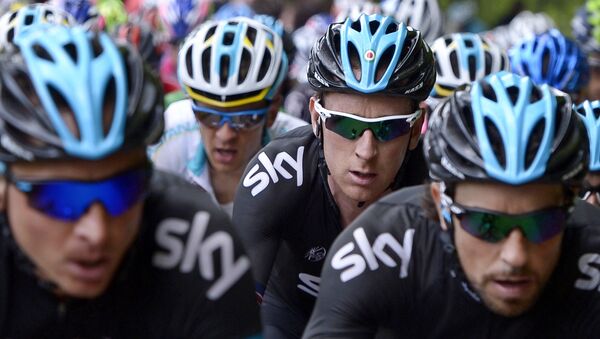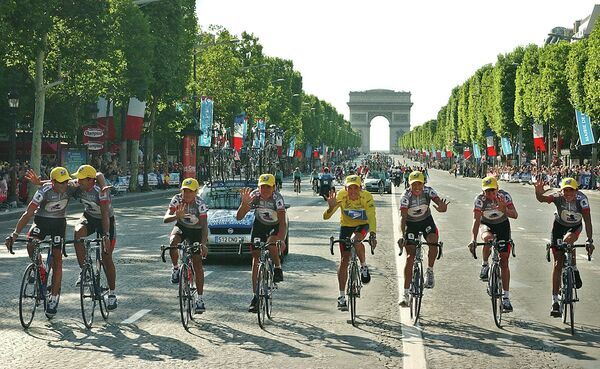Sutton became enraged by the line of questioning from Mary O’Rourke QC, a barrister representing Team Sky’s former doctor Richard Freeman, who is facing a fitness to practice tribunal.
Freeman, who is facing a charge of medical misconduct from the General Medical Council, could be struck off if found guilty.
Another bizarre moment in the Dr Freeman medical tribunal as Shane Sutton addresses allegations of erectile dysfunction. "You are telling the press I can’t get a hard on - my wife wants to testify that you are a bloody liar."
— Sean Ingle (@seaningle) November 12, 2019
Before storming out Sutton told the hearing: "I've answered your questions, taken your bullying, and my children have taken your gutter tactics in the press…I've looked the panel in the eye, I'm not lying. I'm going to leave the hearing now.”
Freeman has admitted testosterone in 2011 but has said he did it on behalf of Sutton, who he claimed was suffering from erectile dysfunction, rather than to supply to Team Sky cyclists.
As the coach Shane Sutton melts down and the snowflake doctor Richard Freeman just melts I want to know where is the rider, Sir Bradley Wiggins, the head of medicine, Steve Peters, and the man that ran the show, Sir Dave Brailsford? They should be answering for this (esp. SP)
— Glen Cottingley (@GlenCottingley) November 12, 2019
Sutton resigned as British Cycling's technical director in 2016 but he has denied "bullied" Freeman into ordering 30 Testogel sachets to treat impotence.
In March this year Team Sky became Team Ineos after the broadcaster ended its decade-long sponsorship and was replaced by Britain’s richest man, Sir Jim Ratcliffe.
After today, Shane Sutton’s evidence to @CommonsCMS May be of interest! Here’s my showdown with him. pic.twitter.com/IUpicSJtRP
— Ian Lucas (@IanCLucas) November 12, 2019
The GMC tribunal has heard that testosterone was used for "micro-dosing" to improve cyclists’ performance during gruelling tests of endurance like the Tour de France and the Giro d’Italia.
But this is by no means the first team cycling has been linked to doping.
Lance Armstrong
Let’s start with the most famous, or infamous, case of them all.
American rider Lance Armstrong became a sporting hero when he battled back from a fight with cancer to win the Tour de France seven times between 1999 and 2005.
With his pop star girlfriend Sheryl Crow and a fortune of US$125 million, Armstrong had it all.
But then the truth came out - he had won all his titles by cheating.
After several years of rumours Armstrong was finally forced to admit in a TV interview with Oprah Winfrey in 2013 that he had been guilty of doping.
Last year Armstrong, 48, was forced to pay $5 million to the US government to settle a lawsuit which could have cost him $100 million.
Armstrong - who divorced Crow in 2006 - remains a wealthy man, largely due to a $100,000 investment he made in Uber, which has paid off handsomely.
Floyd Landis
Lance Armstrong’s cheating only came to light after another American cyclist, Floyd Landis, was banned for doping.
Landis won the 2006 Tour de France but four days later he tested positive for an illegal level of testosterone.
When Landis was disgraced he decided to become a whistleblower and basically said: “Well, I’m not the only one doing it.”
Sutton is asked by O'Rourke about whether he is read Floyd Landis, Lance Armstrong or Dr Freeman’s books. “I have never read a book in my life, the only book I have read is about Peter Brock, the famous racing driver," he replies.
— Sean Ingle (@seaningle) November 12, 2019
Landis, 44, did not come out of it too badly - he was paid US$750,000 for his testimony and even after paying back $478,454 to donors of the Floyd Fairness Fund - he had enough to start his own professional cycling team.
Arthur Linton
Drugs and cycling go way back.
In the 19th century the first doping scandal involved the death of a Welsh cyclist, Arthur Linton.
The first Tour de France took place in 1903 but before that the premier road race in Europe was the Bordeaux-Paris ride.
Arthur Linton - champion cyclist - Aberaman's finest pic.twitter.com/LFfELWaP7n
— Dafydd Trystan (@DafyddTrystan) July 22, 2014
On 25 May 1896 Linton, who was from Wales but was often referred to as English, was battling it out with France’s Gaston Rivière at the finishing line.
Reuters reported: “The finish was exceedingly close, Linton arriving at 9h 17min 18sec and Rivière 1min 2sec later. The Englishman was greatly exhausted, while Rivière was in pretty good condition."
Linton, 27, recovered enough to ride in several more races but on 23 July he died at home in Aberaman, Wales.
It was later claimed that his manager, the unscrupulous Choppy Warburton, had given him a concoction made from cocaine, caffeine and strychnine during the Bordeaux-Paris which had enabled him to beat Rivière.
Knud Enemark Jensen
Back in 1960, at the Olympic Games in Rome, Danish rider Knud Enemark Jensen, 23, died during a team time trial.
The race had taken place in 40 degrees heat and his death was initially ascribed to heatstroke.
An autopsy which showed he had been using amphetamines.
As a result of those scandals rules were introduced at the 1968 Olympics to combat doping by checking athletes regularly.
US Team at 1984 Olympics
At the 1984 Olympics in Los Angeles the US cycling team did much better than in previous Games but their success was severely tarnished when it became clear most of their riders had blood transfusions before their races, a practice known as blood doping.
The transfusions allowed more red blood cells to reach the riders' heart and consequently more oxygen would be provided to their muscles, boosting performance.
It was not technically illegal but it was completely against the Olympic spirit.
National coach Eddie Borysewicz had urged riders to do it and set up a clinic in a Los Angeles hotel room.
Four of the seven athletes who had transfusions won medals, including Steve Hegg and Pat McDonough.
Blood doping was banned by the International Olympic Committee in 1985.
Jacky Durand
French cyclist Jacky Durand was a top rider in the 1990s - he won the Tour of Flanders in 1992 and also won three stages of the Tour de France.
He was given a one month suspension for taking drugs during the Tour de la Côte Picarde in 1996 but it was only in 2013 that he finally admitted he had taken EPO (Erythropoietin) throughout his career.
His name was on a list, published by the French Senate in 2013, of those who had given samples during the 1998 Tour de France and been tested positive for EPO in 2004.



